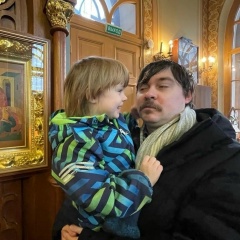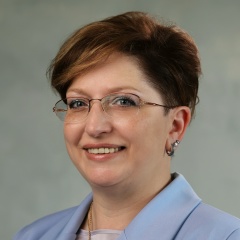Все-таки умница Августин, пишет не то, что до Халкидонского, но даже за 10 лет до Эфесского собора. А формула "в единство лица со Словом" даже предвосхищает определение 5-го Вселенского собора.
"Так, Христос Иисус Сын Божий есть и Бог, и человек. Бог прежде всех веков, человек в нашем веке. Бог, потому что - Слово Божие "ибо Богом было Слово" (Ин 1.1); человек же потому, что в единство лица со Словом вступила разумная душа и плоть. Поэтому, Он - Бог, Он и Отец - одно (Ин 10.30); поскольку же человек, Отец - более Его (Ин 14.28). Ибо, хотя он был единственным Сыном Божьим, Сыном не по благодати, но по природе, почему был и полон благодати, стал и сыном человеческим: один и тот же был тем и другим, из обоих - один Христос. "Ибо, так как Он был в образе Бога, Он не считал хищением быть тем, чем был по природе, то есть равным Богу. Истощил же Себя, приняв образ раба" (Флп 2.6,7), не теряя или не уменьшая образа Божия. А поэтому и меньшим стал, и остался равным, и то и другое - один, как сказано; но иное, как Слово, иное, как человек: как Слово - равен Отцу, как человек - меньший. Один Сын Божий, и Он же - Сын Человеческий; один Сын Человеческий и он же - Сын Божий; не два Сына Божия, Бог и человек, но один Сын Божий. Бог без начала, человек с известного начала, Господь наш Иисус Христос."
"Так, Христос Иисус Сын Божий есть и Бог, и человек. Бог прежде всех веков, человек в нашем веке. Бог, потому что - Слово Божие "ибо Богом было Слово" (Ин 1.1); человек же потому, что в единство лица со Словом вступила разумная душа и плоть. Поэтому, Он - Бог, Он и Отец - одно (Ин 10.30); поскольку же человек, Отец - более Его (Ин 14.28). Ибо, хотя он был единственным Сыном Божьим, Сыном не по благодати, но по природе, почему был и полон благодати, стал и сыном человеческим: один и тот же был тем и другим, из обоих - один Христос. "Ибо, так как Он был в образе Бога, Он не считал хищением быть тем, чем был по природе, то есть равным Богу. Истощил же Себя, приняв образ раба" (Флп 2.6,7), не теряя или не уменьшая образа Божия. А поэтому и меньшим стал, и остался равным, и то и другое - один, как сказано; но иное, как Слово, иное, как человек: как Слово - равен Отцу, как человек - меньший. Один Сын Божий, и Он же - Сын Человеческий; один Сын Человеческий и он же - Сын Божий; не два Сына Божия, Бог и человек, но один Сын Божий. Бог без начала, человек с известного начала, Господь наш Иисус Христос."
Still, clever Augustine, writes not what was before Chalcedon, but even 10 years before the Council of Ephesus. And the formula "in unity of face with the Word" even anticipates the definition of the 5th Ecumenical Council.
"So, Jesus Christ the Son of God is both God and man. God is before all ages, a man in our century. God, because - the Word of God" for God was the Word "(John 1.1); man, because in the unity of the face a rational soul and flesh entered with the Word, therefore, He is God, He and the Father are one (Jn. 10.30); since man, the Father is more than him (Jn. 14.28), for although he was the only Son of God, the Son was not by grace but by nature, why he was full of grace, he also became the son of man: one and the same was the one and the other, of both - the same Christ. "For, since He was in the image of God, He did not it was a theft to be what he was by nature, that is, equal to God. He exhausted Himself by adopting the image of a slave "(Phil. 2.6,7), without losing or diminishing the image of God. Therefore, he became less and remained equal, both of them were one, as said, but differently, the Word, different as a man: as the Word is equal to the Father, as a man is lesser: One Son of God, and He is the Son of Man; one Son of Man and he is the Son of God; not two Sons of God, God and man, but one Son of God. God without a beginning, a man from a certain beginning, our Lord Jesus Christ. "
"So, Jesus Christ the Son of God is both God and man. God is before all ages, a man in our century. God, because - the Word of God" for God was the Word "(John 1.1); man, because in the unity of the face a rational soul and flesh entered with the Word, therefore, He is God, He and the Father are one (Jn. 10.30); since man, the Father is more than him (Jn. 14.28), for although he was the only Son of God, the Son was not by grace but by nature, why he was full of grace, he also became the son of man: one and the same was the one and the other, of both - the same Christ. "For, since He was in the image of God, He did not it was a theft to be what he was by nature, that is, equal to God. He exhausted Himself by adopting the image of a slave "(Phil. 2.6,7), without losing or diminishing the image of God. Therefore, he became less and remained equal, both of them were one, as said, but differently, the Word, different as a man: as the Word is equal to the Father, as a man is lesser: One Son of God, and He is the Son of Man; one Son of Man and he is the Son of God; not two Sons of God, God and man, but one Son of God. God without a beginning, a man from a certain beginning, our Lord Jesus Christ. "
У записи 3 лайков,
1 репостов.
1 репостов.
Эту запись оставил(а) на своей стене Виктор Петров





















![Стас Однолетков -=[strast]=- Стас Однолетков -=[strast]=-](https://sun9-50.vkuserphoto.ru/s/v1/ig2/BQKIUfD3kthNCNNY9BS69xiPt_GjwVRhAU8D64L6gfeFjcmrTqYrLAC9NKgCppVxwhm79Mi5RypIHhjSHOhQK2uy.jpg?quality=95&crop=347,544,400,400&as=32x32,48x48,72x72,108x108,160x160,240x240,360x360&ava=1&cs=200x200)


